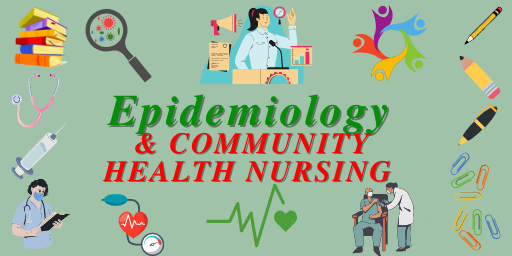Epidemiology formulates new relationships and new associations between nursing and public health. In today’s challenging and provocative times, epidemiology helps nurses meet the changing needs of the community through nursing methods and tools shared by all members of the multidisciplinary team.
Community Health Nursing and Epidemiology
This shared language improves inter-professional communication and trust. At the same time, the unique selling points of the nursing profession can be maintained and presented within the framework of epidemiological theories and methods.
Benefits of Using Epidemiology in CHN Practice
Epidemiology, Public Health and Community Health Nursing: Spare roots for public health and community health nursing, with involvement of biostatistics.
Nursing and Epidemiology and Community Health
Epidemiology brings a dynamic and exciting perspective to community health care. The epidemiological process adds hypothetical methods of new problem-solving techniques to the nursing process for community practice.
The benefits of using an epidemiological perspective for nursing are as follows.
- Epidemiology provides a framework within which basic and behavioral sciences can be used for the practice of community nursing.
- The extended nursing process through the application of epidemiological methods to describe community needs and to evaluate nursing services.
- The principle of family public health is the unity of society. Disease prevention and control as well as health promotion are activated and quantified by the epidemiological approach.
- Epidemiology provides an interdisciplinary language to promote inter-professional communication and trust.
- An epidemiological perspective offers a method to broaden the relationship between family problems and community well-being.
- The epidemiological model promotes understanding of the relationship between the environment and the pathogens that put susceptible populations at risk of adverse health effects.
- Epidemiology provides a time-honored method of quantifying nursing outcomes, such as B. Relapses. Lack of compliance and activities of daily living to promote and improve the quality of care in the community.
Necessity of Epidemiology for Community Health
In addition, examining the prevalence of diseases and health problems is not sufficient. The fundamental goal of epidemiology is to search for the factors that influence and determine the distributions observed. The diseases of individuals are usually determined by a selective operation of one or more factors. Moreover, our environment and blind destruction is so complex that confining our research to individual diseases can do little to contribute to our efforts to solve community health problems.
The epidemiologist must study a series of cases of similar diseases or related health problems as they occur across the population and then help identify the factors at work in the affected population. Therefore, the discovery of the factors that cause or contribute to the occurrence of a particular disease or health problem is the main concern of epidemiology.
Satisfying scientific curiosity will lead to a fuller understanding of disease processes. In turn, a better understanding of the epidemiological approach will enable healthcare providers to plan, implement and evaluate effective interventions for health promotion and disease and disability prevention and control.
The use of epidemiology helps the community health worker in many ways as she is the person in the field dealing with people in different situations. So, epidemiology helps the community health workers to identify and investigate the problems, formulate alternative measures and implement the prevention and control of the problem, and helps to evaluate the effectiveness of the measures.
For example, nurses play an active role in the prevention and control of communicable diseases, which includes participating in early detection and treatment, reporting certain specific diseases to health authorities, contact tracing, monitoring them, identifying injection sources, and educating people about genes. Therefore, knowledge of epidemiology is essential for any nurse to practice successfully.
What is Epidemiology, Public Health and Community Health Nursing?
Why is Epidemiology, Public Health and Community Health Nursing?
How is Epidemiology, Public Health and Community Health Nursing?
Need of Epidemiology, Public Health and Community Health Nursing?
Epidemiology, Public Health and Community Health Nursing?
Read More:
https://nurseseducator.com/dialectic-teaching-with-team-based-learning/
https://nurseseducator.com/high-fidelity-simulation-use-in-nursing-education/
First NCLEX Exam Center In Pakistan From Lahore (Mall of Lahore) to the Global Nursing
Categories of Journals: W, X, Y and Z Category Journal In Nursing Education
AI in Healthcare Content Creation: A Double-Edged Sword and Scary
Social Links:
https://www.facebook.com/nurseseducator/
https://www.instagram.com/nurseseducator/
